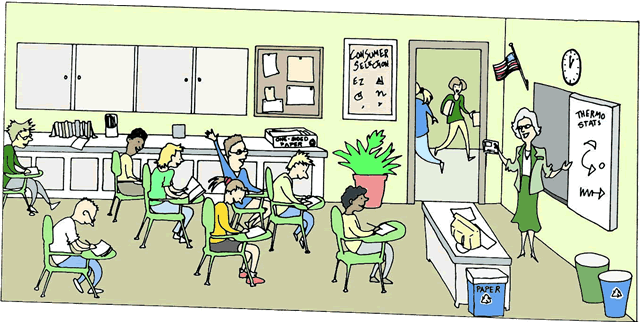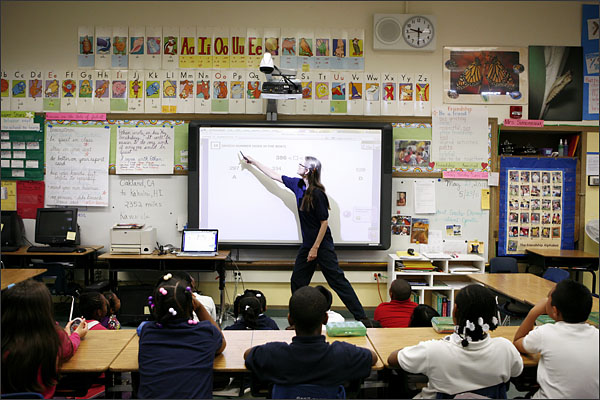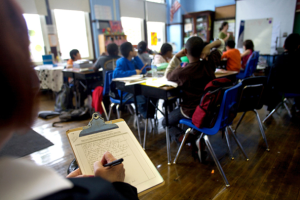
On 22nd January, HMCI published information for OFSTED inspectors as to how they may go about judging the standards of teaching now that they are, in theory, no longer able to dictate a preferred teaching style.
He said:
“There is so much more that could be said about teaching without infringing the professional judgement of teachers to decide the most appropriate style of teaching to get the best out of their students.”
Many SLT in a large majority of schools are constantly on high-alert, always anxious to know what OFSTED are looking for. Therefore, it is almost certain that the following advice, or similar guidance, will form the basis for internal observations too. Let’s look at the list and see how little it infringes on our professional judgement: how much freedom it allows us to decide our own style of teaching:
• Do lessons start promptly?
Fair enough. Although, not always controllable by the teacher (especially in secondary schools). There will often be a few recalcitrant pupils turning up late, disrupting the start of lessons. Some things are difficult to control. It isn’t clear here how much that will be taken into account.
• Are children focused and attentive because the teaching is stimulating?
I blogged about this very subject just before Christmas. I’ll reiterate what I said there: To imply that pupils’ level of ‘engagement’, or, as worded here, how ‘focused and attentive’ they are is because of ‘stimulating’ teaching is highly dangerous and, I think, actually bordering on being irresponsible. Some pupils will find some lessons more interesting and stimulating than others. Either way, the extent to which how stimulating a lesson is has any impact on long-term learning is currently the subject of much debate. Until we know whether it matters or not, it might have been safer for OFSTED to avoid mention of this altogether.

• Is the pace of the lesson good because the teacher is proactive and dynamic in the classroom?
Whenever I see the word ‘pace’ I suspect we may be re-entering the realms of the ‘variety of activities, multiple part, showcase lessons’. The everyday reality is that in some lessons the pace is painfully slow. Does this necessarily mean that the learning is poor? No. In fact, the slower the pace, the more the children take on board and are able to recall, in my experience. And what exactly does ‘dynamic’ mean? How ‘dynamic’ am I expected to be? What is the gauge for this? Is this not looking suspiciously reminiscent of the one-off, showy ‘OFSTED’ lessons that we were led to believe were no longer necessary?
I want to teach information and techniques that my pupils commit to long term memory; and then employ, ultimately, to pass exams. Therefore, I no longer expect my teaching or lessons to be judged on the basis of how ‘dynamic and pacey’ they are. How proactive I am is also up to me, and should be based on my own professional judgement. I may be deliberately non-proactive at times, in order to push pupils to think for themselves and avoid spoon-feeding information to them.
• Is homework regularly given?
Again, the subject of much debate at the moment. How useful, exactly, is homework? Should any teacher be marked-down (potentially) on something that, by its very nature, will not even take place in the classroom?

• Is literacy a key component of lessons across the curriculum?
Well, yes. I can answer that straight away. Literacy is everywhere. What this really means is: Is literacy referred to, specifically? Another box to be ticked.
• Do teachers use display and technology to support teaching?
I find this particularly worrying. I display my pupils’ work proudly. I also update my displays regularly. Will this tick the box for ‘supporting my teaching’? Who knows!
As for technology, last week – as we’re doing a writing topic on forests- you were more likely to find twigs, leaves and moss on my pupils’ desks than a laptop.
I also strongly suspect that this statement will require me to use my interactive whiteboard far more than I may otherwise choose to. So much for no preferred way of doing things!
• Are low expectations resulting in worksheets being used rather than textbooks?
I rarely use textbooks or worksheets, but I know that both can be useful. Sometimes a section of a textbook fits perfectly with what I’m planning to teach; therefore, I’ll use it. The same goes for worksheets: I have several worksheets that I use quite often because they fit well with a particular topic or scheme. On other occasions, I produce my own worksheets (often in the form of writing frames) to support particular pupils or a particular task. Neither choice is as a result of ‘low expectations’. I know that a teacher who relies solely on worksheets should be challenged about that, but it is easy to see how the above statement could be used by school management to demonise the use of all worksheets.
• Are the most able children provided with work which stretches them and allows them to fulfill their true potential?
Again, this is fair enough. But I would like to add that the above statement should be applied to all pupils.
• Are children expected to take books home to do their homework and return them the following day?
No. Not in my case, at least. That is not our policy. Our pupils never take their books home. Also, I’d like to be able to decide when I want it returned by.
• Does marking give a clear indication of what the children have to do to improve and are clear targets being set?
Yes. This box will be ticked by me because we have to write NC Level linked APP targets when marking. I was rather hoping that would come to an end soon and I could go back to giving my own, bespoke advice. In the eyes of my SLT, I fear this statement will only legitimise and further validate the marking policy we are currently using.
• Is the structure of the lesson promoting good learning and are children given sufficient time to practice and reinforce what is being taught?
A reference to lesson structure. Could this be an insidious way of implying that some lesson structures may be preferable to others, after all? Also, a slight contradiction to the ‘pacey’ statement (above). What exactly is ‘good learning’? Surely we need to know? Practice and reinforcement take time and slog. It is very difficult to promote either of these whilst simultaneously trying to be ‘dynamic and pacey’. This is the nuts and bolts of learning: Hard work and study. It is what really counts, I think. To judge the effectiveness of this in a short lesson observation could be tricky. You may need an observer or inspector to be present for a whole half term.
• Do teachers have sufficient expertise to be able to impart to students the necessary knowledge and skills to succeed?
Yes, I fully agree. It is the qualifications of those making this judgement that concerns me. How can we be certain that our level of expertise will be judged fairly?
• Does the school have a robust professional development programme which is improving the quality of teaching by disseminating good practice across the school or college?
This is interesting. I do think that sharing ideas and good practice with colleagues has the potential to be the best CPD of all. I hope this statement may encourage this more.
- Are teaching assistants supporting teaching effectively or are they simply ‘floating about’?”
Again, no mention of how this will be judged. How I choose to employ the skills of a teaching assistant may not fit with what an inspector would view as ‘supporting teaching effectively’? And so the worries continue…
It could be argued that to make judgments using many of the examples above, may well require inspectors to display a preference for a particular style of teaching. To say they are no longer doing this would mean that lists featuring any language that could conceivably be turned into a tick-list remain absent from any guidance.
I’m afraid there is just too much going on in the list above to avoid any guarantee of this. It seems to me that OFSTED are still trying to dictate how teachers do their jobs, and also what tools they use. Therefore, the question arises: have OFSTED really changed their tune, or have they just played around and tinkered with the semantics?
please follow me on Twitter: @cazzypot




Reblogged this on The Echo Chamber.
LikeLike
Check out Some Common Myths in Teaching pages 12 – 14 of Moving English Forward (OFSTED report 2012) http://www.ofsted.gov.uk/resources/moving-english-forward. It’s surprisingly critical of slavish obedience to “pace”, “constant review of learning” etc
LikeLike
Contradicting their own advice, then? Thank you for linking to this, John..interesting times!
LikeLike
You don’t WEIGH a pig to make it fatter !
LikeLike
Exactly so.
LikeLike
Pingback: Can OFSTED stop publishing ridiculous reports, even if they try? | Scenes From The Battleground
Pingback: Ofsted: Is the new orthodoxy really that there is no orthodoxy? : RSA blogs
Pingback: Bloggers lead the campaign to reform Ofsted | Pragmatic Education